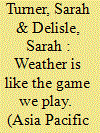|
|
|
Sort Order |
|
|
|
Items / Page
|
|
|
|
|
|
|
| Srl | Item |
| 1 |
ID:
149594


|
|
|
|
|
| Summary/Abstract |
This paper describes the recent emergence of alternative food networks in China in the context of widespread food quality concerns. Drawing on interviews and public blog posts, we illustrate how participants in these networks are moving beyond instrumental market relations and developing the collective agency necessary to participate in shaping China's food system. We argue that the initiators and participants in these alternative food networks are not only individual shoppers who ‘vote with their chopsticks’, but are also nascent activists deploying grassroots community organising strategies. We reveal how these networks are using inclusive and reflexive processes to build diverse networks, how they are using internet communications to extend their reach, voice dissent and engage in nascent ‘bottom up’ policy formation, and how they are building influential connections and actively, but unofficially, expanding linkages to broader emancipatory spaces of global and social justice movements.
|
|
|
|
|
|
|
|
|
|
|
|
|
|
|
|
| 2 |
ID:
149600


|
|
|
|
|
| Summary/Abstract |
This paper uses a case study of fisheries co-management in Hawaii to explore barriers to community participation in resource management and the reasons for these impediments. Our study suggests that while fishers may disobey regulations to maximise personal gain, they may also understand the necessity for regulations and desire more stringent enforcement. This seeming paradox reflects the tension between a recognised need to conserve resources through restricting harvests and competitive pressure among individual fishers. When fishers observe insufficient enforcement on the part of government agencies, this may fuel an already present sense of disrespect for and distrust of the government, inhibiting community participation in co-management efforts. This study suggests that rather than attempting to directly encourage community members to participate in co-management efforts, managers should instead focus on enhancing enforcement to alleviate communities' frustration and disrespect. Thus, enhanced enforcement efforts may boost participation in management activities and lead to a more sustainably managed resource.
|
|
|
|
|
|
|
|
|
|
|
|
|
|
|
|
| 3 |
ID:
149595


|
|
|
|
|
| Summary/Abstract |
Hong Kong, a part of China, yet separated from it by a borderline and a different social system, relies mostly on China for its fresh food. With a high incidence of food contamination, many Hong Kong people have turned to a new food alternative – locally grown organic vegetables. The number of organic growers has risen significantly over the past decade. This paper examines the emergence of local organic food production in Hong Kong since the turn of the century. Not only is this revival of an interest in agricultural production (manifested in the increase in organic farms and organic food consumers that is related to the global movement of eco-agriculture), it is also intertwined with a public discourse relating to land preservation, the balance between an agricultural economy and urban development and food localism. Continuous food news revealing the scale of substandard and poisonous food produced in China have escalated the scare surrounding unsafe food and has helped turn consumers to local produce and to build the discourses on food localism. The paper argues that such a local food consciousness has been fed by the local politics of resistance against negative influences from China in the evolving cross-border relations between China and Hong Kong.
|
|
|
|
|
|
|
|
|
|
|
|
|
|
|
|
| 4 |
ID:
149593


|
|
|
| 5 |
ID:
149601


|
|
|
|
|
| Summary/Abstract |
The prospects of receiving funding for REDD+ have set many developing countries on a pathway of policy reforms to integrate REDD+ in national legislation. Progress has been slow partly due to the lengthy international negotiations on REDD+ but also because the policy reforms have not been backed by sufficient commitment to make REDD+ implementation feasible. To contribute to a better understanding of why policy and institutional reforms have not been successful in taking REDD+ implementation further, we analyse the institutional landscape of the forestry and environmental sectors in Laos as a case in point. We interviewed stakeholders from national to village levels and found that REDD+ has been effectively on hold in Laos. This is because of recent institutional transformations, rapid staff turnover and limited implementation capacity of government agencies at the national and sub-national levels all of which have led to a heavy reliance on international support and external consultants. The result is that Laos may not be ready to benefit from the international agreement on REDD+. The situation in Laos provides a compelling example of how difficult REDD+ implementation has proven to be in countries where institution building is still in process.
|
|
|
|
|
|
|
|
|
|
|
|
|
|
|
|
| 6 |
ID:
149597


|
|
|
|
|
| Summary/Abstract |
Since the turn of the century, food safety has been one of the most significant social issues in Taiwan. In face of a series of alarming food-poisoning scares, which pushed many Taiwanese to search for good safe food, the Taiwanese authorities have initiated a variety of strategies to handle food production issues. At county level, government sponsored projects, such as rural regeneration projects, have coincided with a wave of return migration, in which young city dwellers have returned to rural towns in order to engage in sustainable food production. There is also a popularising trend of ‘mini-tours’, a leisurely activity that sees urban tourists visiting rural regions in search of ‘authentic’ traditions, such as those around food. This confluence of food safety concerns, official rural regeneration schemes, civil movements for sustainable food production, local tourism and emerging discourses on authentic food and food localism has fashioned an interesting food scene in Taiwan. This paper will examine the impacts of these joint forces. It will also illustrate how local food producers have struggled to construct a new food producer–consumer relationship that also contributes to the sustainable development of Taiwan.
|
|
|
|
|
|
|
|
|
|
|
|
|
|
|
|
| 7 |
ID:
149596


|
|
|
|
|
| Summary/Abstract |
With increasing food contamination incidences and rising concerns about food safety and the future of Japanese culinary traditions, shokuiku (food education) has become a central motif of the Japan government's food polices in recent years. Trying to navigate consumer choices amidst the increasingly globalised culinary scene and the food fear in the aftermath of the 2011 Fukushima nuclear disaster, the Basic Law on Food Education has interwoven discourses on health, the ‘goodness’ of local food, and the political ideologies of being responsible and patriotic citizens in support of the local economies of Japan. Through an empirical study of the school lunch system, this paper examines how food education policies have become an effective apparatus to instil state ideologies and promote national economic interests. Supposedly, shokuiku aims at promoting food knowledge, quality local foods and the health of the Japanese people, yet, against the backdrop of widespread radiation contamination fears, the rigid policies in food education have posed challenges to the state and generated a ‘food dilemma’ to be faced by many Japanese parents.
|
|
|
|
|
|
|
|
|
|
|
|
|
|
|
|
| 8 |
ID:
149599


|
|
|
|
|
| Summary/Abstract |
China's total floating population exceeded 245 million at the end of 2013 and is the largest mobile population in the world. This paper explores the spatial distribution pattern and change characteristics of the net floating population at county scale from 2000 to 2010 using census data. The results show the following: (1) the net floating population increased by 120 million over 10 years, and the mobility of the population had enhanced in this period; (2) the floating population migrated to the three economic zones and provincial capital cities, while the traditional agricultural regions with dense populations experienced continuous outflow of population (which altered spatial agglomeration patterns); (3) eastern China has a high level of natural environment suitability and was a major destination area, but more pressures were placed on the carrying capacity of big cities; and (4) western China, with a relatively weak carrying capacity for resources and environment, was a net outflow region in 2010 – although five provinces had small-scale net inflow because of western-style development strategies. This study is offered as a contribution to understanding the features of China's floating population and will be useful for those shaping policies that guide population migration.
|
|
|
|
|
|
|
|
|
|
|
|
|
|
|
|
| 9 |
ID:
149598


|
|
|
|
|
| Summary/Abstract |
The Vietnamese government, along with country-based non-government organisations, are well aware of the vulnerability of Vietnam's coastal and low-lying areas to extreme weather events. Yet scant attention has been paid to extreme weather hazards affecting Vietnam's northern mountainous regions and the livelihoods of ethnic minority farmers residing there. Building on conceptual tools from vulnerability, food security and sustainable livelihoods literatures, we examine the impacts of extreme weather, namely drought and severe cold spells, in Vietnam's northern uplands. We explore the degree to which these events impact the livelihood portfolios and food security of ethnic minority farmers, and examine the coping strategies households initiate, based on their ecological knowledge as well as recent market integration initiatives. Drawing on ethnographic fieldwork with ethnic minority Hmong and Yao semi-subsistence households undertaken yearly from 2012 to 2014, we demonstrate that financial capital – now more central to households' livelihoods than ever before due to state-sponsored agricultural intensification – is an important means for farmers to cope with extreme weather events. Yet concurrently, longstanding culturally rooted social capital, networks and ties remain critical. Nonetheless, short- and long-term adaptation is not widespread, leading us to investigate possible explanations.
|
|
|
|
|
|
|
|
|
|
|
|
|
|
|
|
|
|
|
|
|